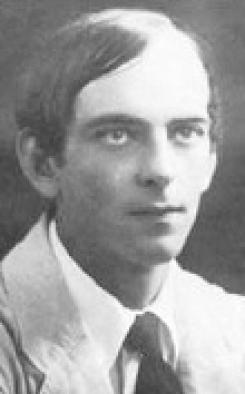September 24, 2018
Mercy Day
To the Sun
O let your shining orb grow dim,
Of Christ the mirror and the shield,
That I may gaze through you to Him,
See half the miracle revealed,
And in your seven hues behold
The Blue Man walking in the sea;
The Green beneath the summer tree,
Who called the children; then the Gold,
With palms; the Orange, flaring bold
With scourges; Purple in the garden
(As Greco saw); and then the Red
Torero (Him who took the toss
And rode the black horns of the cross –
But rose snow-silver from the dead!).
-Roy Campbell
In Blake’s immortal phrase, poets see not with the eye but through the eye. With the aid of the earthly sun and its rainbow hues, poet Roy Campbell invites us to look through our eyes to Christ, the Sun and Light of the World (Jn 7:12).
 Roy Campbell (1901-1957) was South African. His father was a Scots-Ulster man and his mother was of Scottish origin. Considered by Eliot to be one of the best poets writing in English between the two world wars, yet he fell out of favour with colleagues because of his cultivation of fascism. It has been said that the rarity of his inclusions in anthologies was mainly due to the fact that he supported Franco during the Spanish civil war. He did live the greater part of his life in Toledo in Spain, and became a Catholic. He steeped himself in Carmelite mysticism and is best known for his translation of the poems of St John of the Cross.
Roy Campbell (1901-1957) was South African. His father was a Scots-Ulster man and his mother was of Scottish origin. Considered by Eliot to be one of the best poets writing in English between the two world wars, yet he fell out of favour with colleagues because of his cultivation of fascism. It has been said that the rarity of his inclusions in anthologies was mainly due to the fact that he supported Franco during the Spanish civil war. He did live the greater part of his life in Toledo in Spain, and became a Catholic. He steeped himself in Carmelite mysticism and is best known for his translation of the poems of St John of the Cross.
In this beautiful poem, the sun is both mirror and shield of the mystery of Christ. Mirror, in that the colour symbols of the rainbow evoke the life of Jesus in a way that touches the imagination, and shield, in that just as the naked human eye cannot look directly at the sun, the poet is aware that what he expresses in symbol and imagery of the Sun is still only half the miracle revealed.
Through the seven hues we get a brief trajectory of Jesus’ life, somewhat as the liturgy gives from mid-January to the Easter season. There is The Blue Man walking on the sea who evokes the cosmic identity of the Lord. Then there is the homely Galilean image of The Green Man taking time out beneath the tree, with the children and blessing them. And then there is the seductive and more ambiguous Gold which gives us a sense that the simplicity of Galilee is being left behind. As the gospels tell us, Jesus now chooses to set his face toward Jerusalem and the inevitable confrontations with power and establishment figures. From now on the colours become dense, both flaring angry and also murky. The heaviness of the murky Purple in the garden isolates the lonely figure and weighs him down. We feel that we are somehow part of the scene and that the whole of humanity is here. The prophet Isaiah (53:5-6) read during Holy Week, reminds us that it is for us: For the Lord has laid on him the iniquities of us all. He was wounded for our transgressions, crushed for our iniquities; upon him was the punishment that made us whole. And by his wounds we were healed.
The poet moves on to the death of Christ as a final victory event. Already the light of resurrection is shining. The colour lightens to the brilliant red of the Torero, who is in charge. He takes the toss. He rides the black horns of the cross. With such crescendo, such heightening of strong colour, we could almost miss the lovely last line. The Snow Silver of resurrection steals upon us like dawn breaking, Only God brings new creation out of sin and death and he never ceases to do so.
This is a heartening and affectionate poem that you can call on at any time. I suggest that you forget the commentary and take this poem away, for a poem that speaks to, as Mary Oliver says, is like ‘bread in the pockets of the hungry.’
Messages to: Jo O'Donovan rsm
Poetry commentary by Sr Jo previously published on mercyworld.org:
* The Nativity by C.S. Lewis
* To My Daughter Betty, the Gift of God by Tom Kettle
* The Hospital by Patrick Kavanagh
* I See His blood Upon the Rose by Joseph Plunkett
* Eucharist by Nora Wall rsm
* 'Spring' by Gerard Manley Hopkins sj
*'Travelling through the Dark' by William Stafford
* 'Men Go To God' by Dietrich Bonhoeffer
* 'Advent' by Patrick Kavanagh
* 'This Above All is Precious and Remarkable' by John Wain
* 'Spring and Fall: To a Young Child' by Gerard Manley Hopkins sj
Image: Roy Campbell. Source